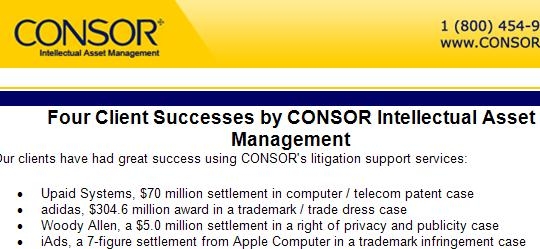Shortly after Apple announced its iAd in-app advertising program in April, Innovate Media Group LLC sued Apple, accusing the company of trademark infringement and unfair competition. Innovate Media began producing its "iAds" online video advertisements, in 2006, and filed for the trademark in 2007.
CNET reports that Consor, an intellectual property consulting firm involved in the suit may have inadvertently revealed details of the settlement, which was quietly reached in July. Apple is now the "last listed owner" of both of Innovate Media's iAds trademarks, and has since resubmitted several applications for the iAd trademark.
Last week, Consor posted a release highlighting the successes of some of its clients that let slip information on the settlement.
"iAds, a 7-figure settlement from Apple Computer in a trademark infringement case," the note read, boasting that Consor's analysis and quantification were instrumental to Innovate Media reaching "a highly favorable settlement with Apple."
Doug Bania, who oversees Consor's business development and licensing units, initially told Greg Sandoval, the author of the CNET report, that the announcement "was never posted," but when Sandoval replied that the article was available on the web, Bania said some of the information "wasn't accurate."
This isn't the first time Apple has introduced a product before it owned the name. In January, Fujitsu revealed that it possessed the iPad name. Apple acquired the trademark from Fujitsu just weeks before the release of the iPad. Last week, a Taiwanese company threatened to sue Apple for $1.5 billion, claiming that an earlier deal to sell the iPad trademark didn't include rights for the trademark in China, which were held by an affiliate.
In 2007, Cisco sued Apple over the iPhone trademark within days of Apple introducing the smartphone. The two companies settled the dispute, each retaining the rights to use the iPhone trademark globally.
If the 7-digit settlement figure is to be believed, it's a small price to pay for Apple to gain the interactive in-app advertising platform, which launched in July with $60 million worth of ads committed through the end of 2010. iAd will make its debut on the iPad this month when iOS 4.2 is released for the tablet device.
 Josh Ong
Josh Ong







-m.jpg)






 Charles Martin
Charles Martin
 Christine McKee
Christine McKee
 Wesley Hilliard
Wesley Hilliard
 Malcolm Owen
Malcolm Owen
 Andrew Orr
Andrew Orr
 William Gallagher
William Gallagher
 Sponsored Content
Sponsored Content







8 Comments
It is really curious that company as devoted to perfection as Apple is has such a consistent record of finding itself buying off trademark owners after the fact. It makes me wonder if this might be intentional. But it seems that acquiring clear title to a trademark would be cheaper before a product is released than after. Especially with Apple products that are most often phenomenally successful. Why might they do this on purpose? If their legal department were that bad heads would have rolled and it would be all better by now. Anybody have any ideas about this?
It is really curious that company as devoted to perfection as Apple is has such a consistent record of finding itself buying off trademark owners after the fact.
What we don't know is what was going on before the fact. For example, with the ipad thing, for all we know, Apple bought the rights from the group holding them in good faith believing that global meant global, not global except for a, b and c. With the Fujistu thing, yes they made the payment between announcement and release, but when did the talks start. it could have been before the announcement.
Also, the trademark rules are very specific and it is possible that Apple felt they were within their rights over the whole iAD thing since they were creating a totally different product in a different market. it's possible if it went to court they would have won. It's also possible that the other side knew or feared this as well and thus was more than happy to have Apple buy the 'mark off them rather than lose all the legal fees
Another rule is that you have to have an actual product for sale. Cisco ran into this one after they cancelled the iphone they bought off another company. They were in the last possible days of renewing when they found out that Apple was going to apply once the time was up and announced a half baked 'iphone' that was 'coming soon'. The judge felt that it was clear that they did it just to lock Apple out and collect some 'easy money' and thus ordered them to share
There's too many facts we don't know to really say what is and isn't going on with all the cases until they hit the courts and become public record. That record could also be part of why Apple settles (they don't become record) since we know they love to keep things secret.
ONE MILLION DOLLARS!
BOOM!
I still don't get why Apple still obsesses over the use "i" in front of certain products. It was unique with the iMac and iPod, but not it is pretty stupid sounding.